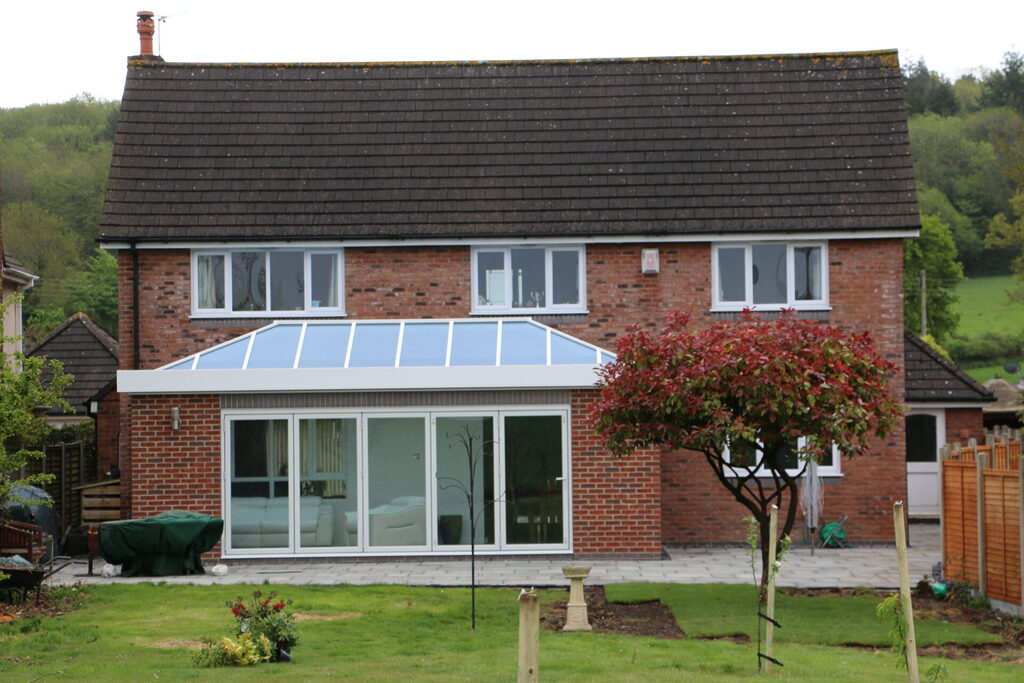Get expert answers from GFD Homes on doors, windows, bifolds, and roof lanterns. Part 6 covers cost, planning permission, condensation, and security.
What You’ll Learn:
- Why composite doors cost more but deliver lasting value
- When you can replace an entrance door without the frame
- Whether sliding doors require planning permission in the UK
- Which type of front door offers the highest level of security
(Estimated Reading Time: 5-6 Minutes)

Introduction
Welcome to the final part of our “Your Questions Answered” series. Over the last five articles, we’ve tackled the most common questions UK homeowners ask about doors, windows, and glazing. From security and costs to finishes and energy efficiency, we’ve covered the issues that really matter.
In Part 6, we’re answering another set of frequently asked questions across composite doors, entrance doors, bifold doors, sliding doors, aluminium front doors, aluminium and uPVC windows, roof lanterns, and front doors.
Composite Doors: Are Composite Doors Expensive?
It’s a fair question. Composite doors do cost more than basic uPVC models, but for good reason:
- They’re stronger and more secure.
- They last longer (30+ years).
- They offer superior thermal insulation.
- They come in a wider range of colours and styles.
At GFD Homes, our Composite Doors are competitively priced thanks to our online supply-only model. You get premium quality without the inflated costs of big national brands.
Entrance Doors: Can I Replace Just the Entrance Door Without Changing the Frame?
Yes, in some cases — but it depends on the condition of your existing frame.
- If the frame is solid and square, you may be able to fit a new door into it.
- If it’s warped, damaged, or not energy-efficient, it’s best to replace both together.
At GFD Homes, we typically supply Entrance Doors as complete door-sets (door + frame) to ensure the best fit, insulation, and security.
Bifold Doors: Do Bifold Doors Open Inwards or Outwards?
Great question — and the answer is, both options are available.
- Outward-opening bifolds: Save space indoors.
- Inward-opening bifolds: Useful if your patio or garden space is limited.
Our Aluminium Bifold Doors can be configured either way, depending on your layout.
Sliding Doors: Do Sliding Doors Need Planning Permission?
This is a concern for many homeowners. In most cases, replacing or installing Sliding Doors does not require planning permission, as long as you’re not altering the structural opening significantly.
Exceptions include:
- Listed buildings.
- Conservation areas.
- Large extensions requiring new openings.
Our team can liaise with builders and architects to ensure compliance with Building Regulations.
Aluminium Front Doors: Are Aluminium Doors Heavy?
Yes — aluminium front doors are heavier than uPVC or timber, but that’s a benefit. The added weight contributes to their strength, security, and premium feel.
Modern hinges and multi-point locking systems are engineered to carry this weight effortlessly, so you’ll experience smooth, reliable operation.
Explore Aluminium Front Doors
Aluminium Windows: Do Aluminium Windows Condensate?
Condensation is more about the quality of glazing and insulation than the frame material. Modern Aluminium Windows feature:
- Thermal breaks to reduce heat transfer.
- Double or triple glazing with warm-edge spacers.
- Proper ventilation integration.
As long as your home is ventilated, condensation should not be a problem.
uPVC Windows: Are uPVC Windows Environmentally Friendly?
This is increasingly important to UK homeowners. While uPVC is a type of plastic, modern uPVC Windows are:
- Long-lasting (20–25 years).
- Low-maintenance, reducing replacement waste.
- Fully recyclable at the end of their life cycle.
Combined with their excellent insulation, uPVC windows can reduce household energy use — another environmental plus.
Roof Lanterns: Do Roof Lanterns Get Dirty Easily?
Yes, roof lanterns are more exposed to rain and dust than vertical windows — but cleaning is straightforward.
Our Roof Lanterns use self-cleaning glass options, which have special coatings that break down dirt and wash it away with rainwater. Combined with aluminium frames that don’t peel or rust, maintenance is minimal.
Front Doors: Which Type of Front Door Is Most Secure?
This is perhaps the most common front door question. The answer depends on material, design, and locking system.
- Composite doors: Multi-point locks + solid core = highly secure.
- Aluminium doors: Rigid frames, advanced locking, and PAS 24/Secured by Design certification.
- uPVC doors: Secure with modern locks, but not as robust as composite or aluminium.
At GFD Homes, both our Composite Doors and Aluminium Front Doors are excellent choices for maximum security.
Conclusion: Closing the Series With Confidence
From painting to planning permission, from condensation to security, this six-part series has answered the questions UK homeowners ask us every day. Our goal has been simple: to give you clear, honest answers — and to show how GFD Homes can help you bring those answers to life.
🛒 Browse the full collection at www.gfdhomes.co.uk
📞 Or call 01642 309576 for expert guidance and a no-pressure quote.
In a rush? Why not contact us via Whatsapp
Browse our Articles
- GFD Homes Answers Top Doors & Windows Questions – Part 1
- GFD Homes: Your Door & Window Questions Answered Part 2
- GFD Homes: Questions on Doors & Windows Answered – Part 3
- GFD Homes: Questions on Doors & Windows Answered – Part 4
- GFD Homes: Questions on Doors & Windows Answered – Part 5
- Looking for Trade Products? Try The Trade Village
FAQs
Are aluminium front doors too heavy for everyday use?
No — while aluminium doors are heavier than uPVC or timber, modern hinges and locks are engineered to carry the weight smoothly.
Do uPVC windows harm the environment?
Not necessarily. Modern uPVC windows are recyclable, long-lasting, and energy-efficient, making them more eco-friendly than older models.
Do roof lanterns require a lot of maintenance?
No. With self-cleaning glass and weather-resistant aluminium frames, roof lanterns are designed for minimal upkeep.
Which door material is the most secure?
Composite and aluminium doors lead the way, offering advanced locks, PAS 24 testing, and Secured by Design certification for peace of mind.

